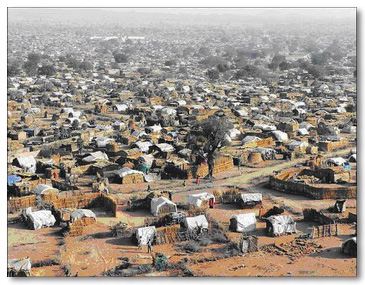The tragedy of Darfur
- JAMES LORENZ
It is early afternoon in the Ramadeqai camp for the displaced on the outskirts of the town of Zalingei in the troubled Darfur region of Sudan. The inhabitants, entering the last days of the Ramadan fast, are sweltering under the October sun. You can feel the lethargy thats descended.
 |
MÉDICINS SANS FRONTIÈRES A camp for Internally
Displaced People in Mornay, West Darfur, Sudan. |
Around 90,000 displaced live in the four camps surrounding Zalingei. The makeshift shelters have been their homes since conflict broke out in Darfur early in 2003. There have been no distributions of shelter materials for over 18 months and their wood, earth and tarpaulin homes look bedraggled.
People fled to the camps looking for protection from the forces that had driven them from their villages. Instead, they found that those same forces encircled the camps, turning their refuge into a place of continuing terror.
Today, in conjunction with the Ministry of Health, Médicins Sans Frontières (MSF) runs the 155-bed hospital in Zalingei, which is free and accessible in theory for both the residents of the town and the displaced in the camps. In practice, the situation is fraught with problems.
“The camp is like an outdoor prison,” explains MSF medical co-ordinator Severine Ramon. “Women are raped when they collect firewood, armed groups roam the camp at night spreading fear among the people and men are afraid of leaving the camp to walk 20 minutes to get medical care in the hospital in town.”
Despite concern over access, the hospital carries out nearly 2,000 consultations per month. “In September we treated six rape victims,” continues Severine Ramon, “but we fear that there may be many more who refuse to come forward because they are afraid to do so.”
The difficulty that patients have in getting medical care is partly the result of the problems aid agencies have in reaching out to them. Since the beginning of 2006, MSF teams have been the victims of over 40 security incidents of varying severity, many of which have taken place on the roads supposedly under the control of the Khartoum government.
The insecurity means that today, MSF is only able to use one road in the whole of Darfur, an area the size of France. All other transport is carried out by UN helicopter or plane. While MSF is still running major healthcare projects in 12 locations across the region, many essential programs, such as mobile clinics outside towns, have been suspended.
The consequences for the people of Darfur, themselves faced with increased tension and violence, are worrying. Few in the area itself see any reason to believe that the situation is going to improve in the near future. |
Simple but life-saving referrals have also become a near impossibility. For surgical cases, for example, MSF was until recently able to transport patients the 60 kilometres from its health centre in Niertiti to the hospital in Zalingei in an MSF vehicle. Following a serious security incident along this road in September, however, the referral service was discontinued and now patients have to rely on private transport.
“With MSF transport, this journey would take about an hour,” explains Severine Ramon. “With the lorries that serve as public transport, it can take up to ten. For a woman in urgent need of a caesarean this can have serious consequences.”
Some programs have had to be completely closed. In September, for instance, a series of violent incidents forced MSF to withdraw from Kutrum in the Jebel Mara in the midst of a cholera outbreak after a series of incidents.
As MSF head of mission Jean-Sebastien Matte explains, “We have not had access to the rebel areas in the Jebel Mara for more than six weeks. We managed to care for about 500 cases of cholera before then, but there were certainly 300 to 400 more that we were unable to see. This means that these people may have died because a lack of medical care. Cholera can be rapidly treated but if there is no way to do so, then it kills you quickly.”
Since the Western-backed Darfur Peace Agreement (DPA) was signed in May, 2006, the situation in the region has undoubtedly worsened. The number of groups involved in the fighting has multiplied, and renewed fighting has begun between the government and groups opposed to the DPA. Across large swaths of Darfur, MSF is unable even to monitor the health situation. Heated rhetoric from both sides of the debate has had consequences on the ground, with the Khartoum government stepping up its propaganda against what it terms as foreign meddling. NGOs have been amongst the first to face this wrath.
The consequences for the people of Darfur, themselves faced with increased tension and violence, are worrying. Few in the area itself see any reason to believe that the situation is going to improve in the near future.
![]()
 This is J. Fraser Field, Founder of CERC. I hope you appreciated this piece. We curate these articles especially for believers like you.
This is J. Fraser Field, Founder of CERC. I hope you appreciated this piece. We curate these articles especially for believers like you.
Please show your appreciation by making a $3 donation. CERC is entirely reader supported.

Acknowledgement
James Lorenz. "The tragedy of Darfur." National Post, (Canada) 22 November, 2006.
Reprinted with permission of the National Post.
The Author
James Lorenz is a spokesman for Médicins Sans Frontières / Doctors Without Borders.
Copyright © 2006 National Post

